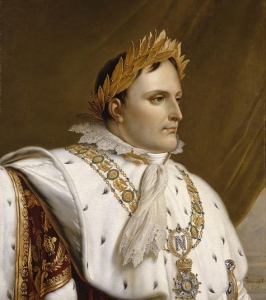Napoleon I
Napoléon Bonaparte (Ajaccio, 15 August 1769 – Island of Sanit Helena, 5 May 1821) was born to a Corsican family with noble origins in Tuscany: his forebears immigrated to Corsica from Sarzana, while a different branch of the family resided in San Miniato, in the province of Pisa, and was useful to the young Napoleon – who wanted to enter the prestigious military college Brienne–le–Château – for the demonstration of his nobility.
Napoleon led a meteoric career in the French army: at twenty years of age, at the outbreak of the French Revolution, he was already an officer and a few years later led the army in the triumphal Italian Campaign, claiming an uninterrupted series of victories. The prestige and popularity that followed cleared the way for the taking of power on 18 Brumaire 1799 (9 November 1799), when Napoleon became First Consul of the new French institutions. A few years later, on 2 December 1804, he became the Emperor of France, self–crowning himself in the presence of Pope Pius VII in the cathedral of Notre Dame in Paris.
After having achieved absolute power over France and a large portion of Europe, the extraordinary commander demonstrated himself to also be a skilful man of state, capable of great reforms. The most important was perhaps the Napoleonic Code, which came into force in 1804 and because of which the legislation of all of the territories belonging to the Empire became unified and modernized.
But the situation was destined to quickly change: after various failed attempts, a coalition formed principally by Great Britain, the Russian Empire and the Prussian Empire repeatedly defeated the French army, constraining Napoleon to go into exile on the island of Elba in 1814. The Corsican commander did not give up and again took power after a daring escape from the Tuscan island: thus began the One Hundred Days, the last days of Napoleon’s domination. Then, defeated in the Battle of Waterloo on 18 June 1815, he was forced a few months later into his final exile on the island of Sant’Elena in the Atlantic Ocean, where he arrived on 16 October of that year. It was there that he passed the last years of his life, writing his memoirs. He died on 5 May 1821 from a stomach tumour.
Napoleon married twice. His first wife, Joséphine de Bauharnais, was his spouse from 1796 to 1809 and was crowned Empress by him in 1804, but the pair never had children. The marriage was annulled and Napoleon married a second time, taking as his next wife Maria Luisa of Austria. Napoléon–François–Charles–Joseph was born of this union in 1811, and was the Emperor’s sole heir.










